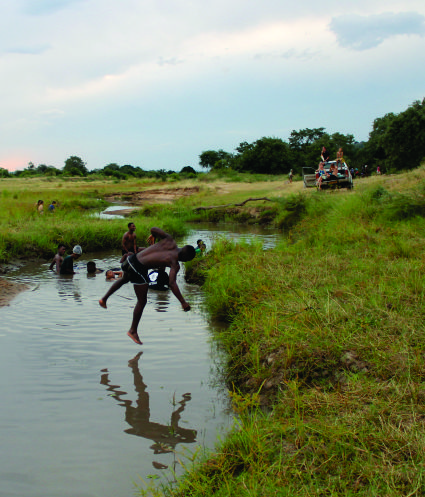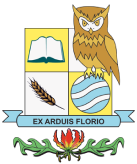Upper 6 Travel and Tourism trip to RIFA

Upper 6 Travel and Tourism trip to RIFA
By: Tonderai Mudede
As part of our Travel and Tourism coursework which includes running an event, the Upper 6 Travel and Tourism class chose RIFA as their prefered destination for this coursework.
Our market was made up of Travel and Tourism students along with Geography students in the lower streams. We spent 5 nights at the camp and learnt a handful of lessons.
Upon arrival we had an introduction with the camp personnel where they outlined the rules of the camp as well as what we were to expect whilst on our expedition. The most important rule was “ Do not panic “. Fortunately this rule was not put to the test as we did not run into any predators whilst in camp.
The following day we woke up at dawn and went for a Famba with our camp leaders. The first lesson we had was on how to track animals in the bush as well as the different types of trees we find in the forests, what they provide to humans and wildlife, including their leaves etcetera. After that we took a walk up Shumba hill. When we reached the top, we were rewarded with a superb view of the Zambezi River, the picturesque landscape as well as a chance to see the Zambian side of the Zambezi lands. We later went for a Famba at dusk to watch the sunset by the Zambezi river and other members went fishing. The fishing experience was disappointing as no-one managed to catch any fish.
On the third day, we got an opportunity to see a goat getting dissected. In the process we got to see the organs of the goat as well as its 4 stomachs, thus we were also in a Biology lesson. After the dissection of the goat, we took its remains and left them scattered on the floodplain in front of our camp so as to attract vultures and sure enough, they came for these remains in large numbers.
The following day was a bit slow because it had rained, thus restricting our movement. Nonetheless we went for a tour in the RIFA museum were we learnt the Latin and Shona names of the animals they had as well as being informed of the different types of endangered species the country had and what the authorities were doing in an effort to try and save them. After our tour of the museum we went for air rifle shooting practice with everyone getting a chance to shoot thrice. Unfortunately some individuals completely missed the target all three times, sending their pellets into the Zambezi woods. In the afternoon we went for a Famba to the Chipandaure river. However, as a result of the rain, we could not continue the excursion and had to call it a day.
Thursday morning was filled with a bit of sadness as it was our last day. We got up for the day and after breakfast, we went to a recycling plant in Chirundu town where we had a talk with the group in charge of the project. We were informed that since the introduction of the project, the number of animals dying as a result of the litter has decreased significantly. Furthermore, we learnt of how the litter is not just burnt but is recycled and used for things such as decorations. After that, we then had a talk with a park ranger who basically informed us of what is required for one to be a ranger and the benefits the job brings to an individual as well as raising awareness on endangered species that we should protect and look out for. After that we then had a drive to the Zimbabwe-Zambian border post and had to walk to the suspended bridge as it could not withhold the weight of our school bus. After this we drove back to camp and we had a barbecue. After that we had our last bonding session with the camp personnel and sang some songs before giving them a vote of thanks and then a devotional to end the day.
Friday morning we departed for Marondera at 7am. The journey back home was as amazing and educational as the one to RIFA as we got the chance to see the amazing scenery that Zimbabwe possesses.
A huge thank you goes to Dave and Elspeth for taking good care of us and providing us with good hospitality and another special thank you goes to Nyasha who was our tour guide and a huge lover of the food we were cooking, for feeding us with knowledge.
Another big thank you goes to Stephanie Mahala who, despite not being part of the Travel and Tourism class, would make herself available and assist us in anyway possible.

.png)